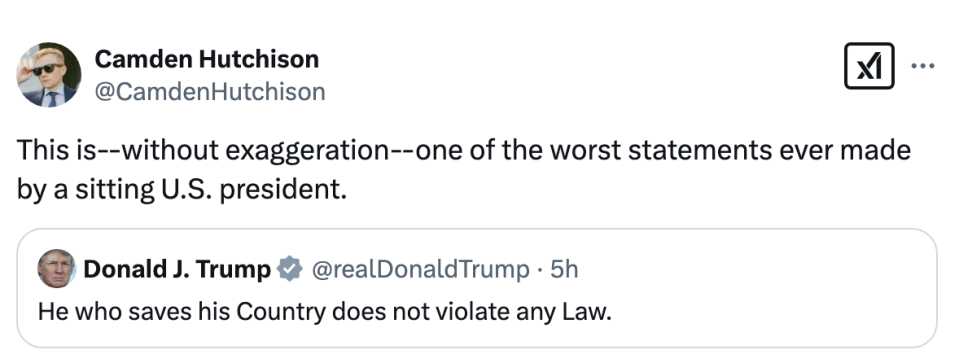Trump has bombed Iran claiming that the Islamist dictatorship was “weeks away” from acquiring nuclear weapons. That’s not true – according to the U.S.’s own intelligence services.
National Intelligence Director Tulsi Gabbard, appointed by Trump, testified under oath three months ago that Iran is nowhere near acquiring nuclear weapons. Mark Warner from the Senate Intelligence Committee testified just the other day that the CIA and other American intelligence agencies have seen no evidence that Iran will soon acquire nuclear weapons. Anonymous CIA sources told the BBC a few days ago that the rhetoric about Iran being just weeks away from a nuclear weapon is a complete and utter lie.
Just like the claims in 2003 that Iraq had weapons of mass destruction, this is false information being used to justify bombing a country in the Middle East – something the “peace president” Trump once said he would never do. But the military-industrial complex generates trillions of dollars – and business stalls if there are no wars in which to use the weapons and bombs.
I have no doubt that Iran’s authoritarian regime wants to acquire nuclear weapons – but the rhetoric that they’re on the brink has been repeated, especially by Israeli Prime Minister Benjamin Netanyahu, for over 30 years. In 1992, he said Iran would have nuclear weapons within five years. In 1995, he wrote in a book that Iran’s nuclear weapons were three to five years away. In 1996, he said Iran was “extremely close” to having nuclear weapons. In 2009, he told American politicians that Iran would have nuclear weapons just a year later. And in 2012, Netanyahu said at the UN that Iran was mere months or weeks away. He has kept using the same rhetoric ever since.
What war hawks often forget is that military action to solve a problem often has the opposite effect. Iran’s authoritarian leadership likely feels it has even more reason to acquire nuclear weapons now that they are vowing “eternal retaliation” against those who attacked them, and Iran’s foreign minister is currently visiting the nuclear-armed Russia to strengthen ties and military cooperation.
There is still no sign that Iran has become any less of a threat due to the attacks from Israel and the U.S. On the contrary, it is glaringly clear that the world is a far more dangerous place now than it was two weeks ago.
What’s truly tragic is that the U.S. had a successful diplomatic process initiated by Obama to prevent Iran from acquiring nuclear weapons – a process now up in flames. Trump tore it up during his first term, only to realize what a sound decision it had been and repeatedly tried to start new negotiations, which all failed. The latest attempt began in March this year and came to an explosive end when Trump chose to bomb the very country he was negotiating with up until yesterday. The art of the deal.
In these terrible times of war, it is more important than ever that the Church stands up for peace and disarmament. Violence always leads to more violence; repaying evil with evil never results in anything good. The cycle of violence must be broken. That is my prayer.
Micael Grenholm is a Swedish church historian, author and an editor for PCPJ.

Pentecostals & Charismatics for Peace & Justice is a multicultural, gender inclusive, and ecumenical organization that promotes peace, justice, and reconciliation work among Pentecostal and Charismatic Christians around the world. If you like what we do, please become a member!
Top photo: Avash Photo – Berno, CC 4.0




















